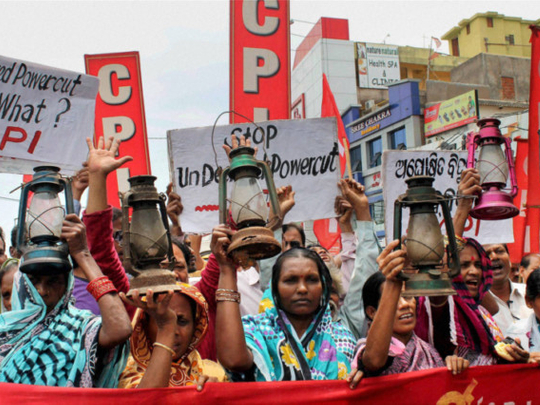
An Italian thread runs through the Congress party’s rout and the downfall of communists in Indian parliamentary elections. No prizes for guessing the Congress’s Italian connection. In the case of the communists, it is Antonio Gramsci, an Italian Marxist theoretician that armchair leftists in India swear by, even as they grapple with an existential crisis after a catastrophic electoral performance.
Let me clarify rightaway that Indian communism is a sham because it is parliamentary and not revolutionary, which is utter negation of Marxism. Phoney as a vegetarian gorging on beef steaks and chicken tikka masala. India’s most famous communist, Jyoti Basu, who nearly became prime minister, once admitted that “We are communists only in name”, but many still foolishly equate India’s home-grown leftists with the comrades in China, Cuba or erstwhile USSR — which is not the case at all. Talk of cheese and chalk!
Voters have this time put the so-called communists in their place. The flagship Communist Party of India (Marxist), or CPI(M), won only nine seats, while the older but smaller Communist Party of India (CPI), won just one in the 545-strong Lok Sabha, or Lower House of the parliament. Taking into account two CPI(M)-supported independents who got elected, the CPI(M)’s tally is 11, but not enough to retain its national party status as per Election Commission rules. Smaller constituents of the Left Front, like Revolutionary Socialist Party and Forward Bloc, have been wiped out.
Remarkably, Left Fron’t Lok Sabha strength has been halved this time — it was 24, including 15 CPI(M) MPs, in 2009. In 2004, there were a record number of CPI(M) MPs — 45 — among the left’s 61. It was an all-time high. In 1999, left’s strength was 43, including 32 CPI(M) MPs. And in 1991, 51 left MPs were elected.
How come the left’s tally in 2014 is down to just a dozen from three states, from a record high of 61 MPs from six states ten years ago? What went wrong? It would be over-simplification to lay the entire blame at the door of Prakash Karat, general secretary of the CPI(M), who is being accused of succeeding what the Indian bourgeoisie had failed to achieve in decades — evicting communists from mainstream Indian politics. But what a fall it has been is best understood by recalling that Basu almost became the prime minister in 1996. He was the unanimous choice of squabbling national leaders who pleaded with Basu to run the country. Eight years later, Left Front emerged as the third-largest group in Lok Sabha after the Congress and Bharatiya Janata Party, eclipsing a wide array of centrist regional outfits like Samajwadi Party and Bahujan Samaj Party. Despite losing ground in 2009, it was still a force to reckon with. But no longer.
Post debacle, Ashok Mitra, an old and ailing communist stalwart who wears his Marxism on his sleeve, lamented in a newspaper that “the country’s under-privileged, persecuted millions would, at least for a while, have none to defend them against the aggression of immensely reinvigorated economic liberalisation policies jointly sponsored by the country’s two principal political parties”.
Mitra’s rant notwithstanding, Indian communists are nothing more than social democrats claiming to fight for the have-nots within the parameters of India’s multi-party parliamentary democracy. Their broadly left-wing politics attracted the poor, religious minorities and educated elite disillusioned with rightist parties. And they did win a reputation for good governance wherever they ruled — West Bengal, Tripura or Kerala — since Independence. But they squandered most of that goodwill.
At present, CPI(M) is in power only in tiny Tripura. In 2011, the CPI(M)-led Left Democratic Front narrowly lost the Kerala assembly elections, but the CPI(M)-led Left Front (LF) in West Bengal was routed from power after 34 years. In 2006, LF had won 229 seats out of 294 in the Bengal assembly. In 2011, the LF tally had come down to a meagre 69. That shattering defeat in the communist stronghold was a precursor to the national rout in the 2014 Lok Sabha elections.
The BJP-Narendra Modi juggernaut suddenly and unexpectedly crushed quite a few political parties. But communists had been losing their relevance for quite some time. The BJP offensive simply hammered a few more nails into that coffin. I think communists have been done-in essentially by fence-sitting and double standards and to some extent by arrogance and corruption. How can any political party be relevant if it cannot make up its mind? Indian communists chose the path of parliamentary democracy. They formed the first communist government in Kerala in 1957. Later they came to power in Bengal and Tripura also. But they mysteriously shunned federal power or power at the Centre. Basu, who was the chief minister of Bengal from 1977 to 2000 — a national record — was keen to accept the 1996 offer for prime ministership, but the CPI(M) politburo turned it down. Basu, who many believe was the best PM India never had, later branded the politburo’s decision as a “historic blunder”.
In 2004, despite having 61 MPs, communists refused to join the Congress-led United Progressive Alliance government. They felt they had the moral high ground by refusing ministerial posts in the UPA regime, which they were propping from the outside. The then prime minister Manmohan Singh flattered the red brigade, calling it his “conscience”. But communists antagonised voters who had sent them to the Lok Sabha to improve their lot, which the communists inexplicably refused to do. In 2008, communists and Singh parted ways over the US-India nuclear deal, prompting the latter to quote political philosopher Anthony Giddens’ remark that the “Left has become the most reactionary force in the world” in disgust.
I think that squandering away successive opportunities to head or join the central government cost the communists dear. They are now an endangered species threatened by extinction.
S.N.M. Abdi is a noted Indian journalist and commentator.











